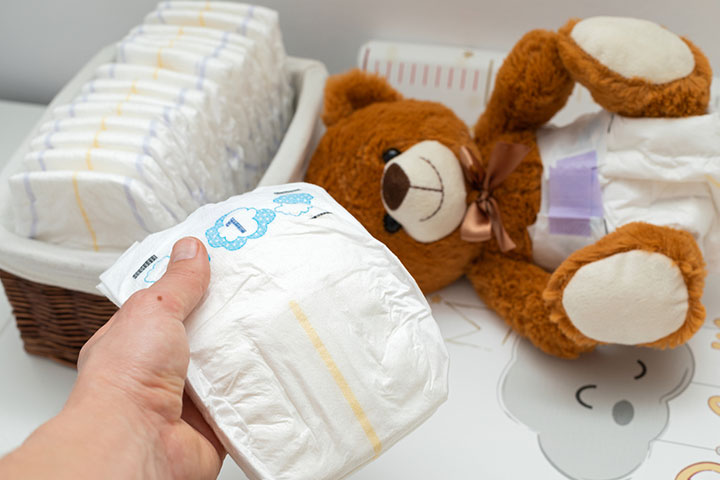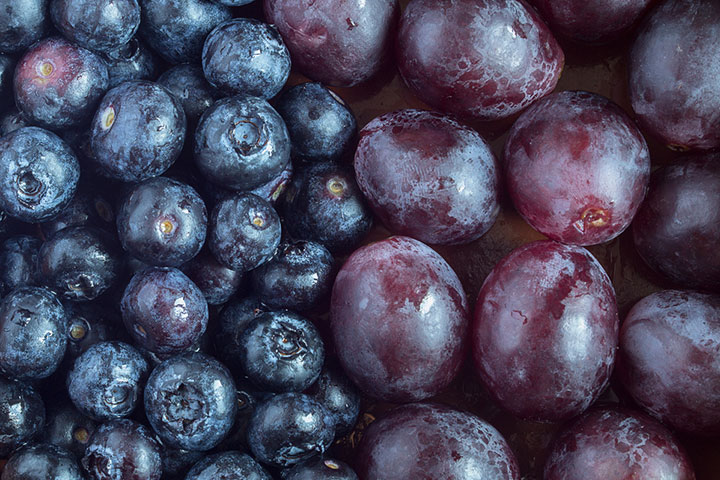Parents often observe the color of their baby’s poop to ensure that they are pooping right. However, a change in bowel movements or poop’s color, such as black poop in babies, can raise concerns.
Baby poop can be of different textures, colors, smells, and consistencies. They can usually be seen in green, yellow, tan, brown, and some other colors as well (1). The usual color should be brown because of the bilirubin pigmentiXThe yellowish pigment made by breaking down red blood cells that travel through the liver and excreted out of the body. secreted from the liver. The bilirubin flows into the small intestines and turns brown as it passes through the small intestines (2). However, any other color of poop in babies could be due to an underlying condition and may require doctor consultation.
Read on to know about black stool in babies, including its cause, meaning behind the colors, and when you should worry.
Is Black Stool In Babies Normal?
While black poop is common in newborns, you should be concerned if you notice it in your baby who is over three days old (3).
The first stool of newborns is called meconium. This sticky stool consists of amniotic fluidiXA liquid in the amniotic sac that surrounds and protects the fetus in the womb during pregnancy, intestinal epithelial cells, lanugo, mucus, bile, and water swallowed in utero. Meconium is often black, green, brown, or yellow and passed 24 to 48 hours following birth.
Several reasons could cause your baby to poop black or tarry feces. While black stools in babies can often be caused by food and medications, which is normal, black stools due to other reasons, such as bleeding in the stomach or any part of their digestive system or gastrointestinal tract, warrants immediate medical attention (4).
If your baby’s black poop is accompanied by a foul smell, it often signals a problem in your baby’s upper digestive tract (5).
What Causes Black Poop In Infants?
The most common causes of black poop in infants include (4) (6)
- Specific foods
Foods such as blueberries, licorice, oreo cookies, dark chocolate, and grape juice can give your baby’s poop a tarry black color.
- Medications
Iron supplements and bismuth-containing medicines, such as Pepto-Bismol, can cause black poop in your baby. These are generally not a cause for concern.
- Digested blood
In some cases, babies digest blood that appears as black poop. This can occur if the baby is breastfeeding and has swallowed blood from the mother’s cracked, bleeding nipples.
These causes are usually not concerning. However, black poop can also result from bleeding in the baby’s digestive tract. The bleeding can occur either in the upper or lower gastrointestinal tract.
Some concerning causes of back poop in babies include (7) (8)
- Internal bleeding such as bleeding in the esophagusiXA muscular tube that passes food and liquids from the mouth to the stomach., stomach, or upper part of the baby’s small intestine
- Gastritis — inflammation of the stomach lining
- Intolerance to milk protein
- Complications of the liver, such as cirrhosis
- Clotting disorders
- PolypsiXA protruding growth of tissue on a surface inside your body or a mucus membrane
When To Seek Medical Attention For Black Poop In Babies?
If you find any of the following signs and symptoms along with your baby’s black poop, call their pediatrician right away (8).
- Dizziness
- Lightheadedness
- Fever
- Blood in the stools
- Vomiting of blood
- Child looking pale
How To Manage Black Stools In Babies?
The treatment for your baby’s black poop depends on the cause.
- If your baby’s black poop results from taking a food item, discontinuing the food item can help resolve the problem.
- If the black stool is due to a medication, the healthcare provider may either stop or prescribe an alternative medicine to resolve the problem.
- If your baby presents other symptoms, the underlying cause needs to be identified and resolved. Diagnostic tests along with medical history and other investigations may be required to determine the cause of your baby’s black poop.
Other Colors Of Baby Poop
Apart from black, the following are other baby poop colors that may indicate an underlying problem.
1. Red poop
Also called bloody stools, 90% of red baby poop is not a result of bleeding. A large number of foods can cause your baby’s poop to turn red. These include beetroot, cranberries, tomato-based foods, and red Jell-O. However, this is usually harmless and disappears with a change in diet (4).
In a few cases, red streaks on your baby’s diaper may indicate something more serious, such as (9)
- Constipation
- A small anal tear
- Bacterial diarrhea (due to infection caused by bacteria)
- Bleeding in the lower part of the digestive system
- HemorrhoidsiXSwollen and enlarged veins in and around your anus and lower rectum, also called piles
2. White poop
This happens if your baby isn’t producing enough bile. Chalky white stools are a cause for concern as they may indicate a liver or gallbladderiXA small pear-shaped internal organ on the upper right portion of the abdomen under the liver problem (7). If you notice your baby passing white or pale gray poop, seek medical advice right away.
3. Dark gray poop
A dark gray baby poop indicates that the baby is not digesting food properly. This is common in formula-fed babies during digestion, as the formula can be difficult for babies to digest.
4. Dark green poop
While green baby stool is normal and often common in breast milk-fed babies, watery green poop can cause worry. Green watery baby poop is common with diarrhea and needs to be treated immediately (9).
5. Orange poop
An orange poop in babies is normal and is indicative of healthy breast milk or formula intake. Solid foods such as carrots or sweet potatoes may also cause orange stools in weaning babies. Additionally, maternal intake of foods or medicines with an orange food dye may get passed on to the baby through breast milk, causing an orange poop (10) (11).
6. Mustard yellow poop
A seedy and pasty mustard-yellow poop is normal in a healthy breastfed baby. Most formula-fed babies may also have a similar pasty poop consistency that is a similar shade of yellow (10) (3).
Black poop in babies is common for the first three days of life and is usually not a cause for concern. However, if your baby is older than three days and still passes black stool, it may be due to underlying factors, such as food or medications your baby is taking or digested blood. In some rare cases, black stools can be due to bleeding in the digestive system. Hence, consult your doctor promptly if the black stools are accompanied by other symptoms, such as fever, blood in the stools, or lightheadedness.
Key Pointers
- Black poop is common in babies and could be due to medications or food.
- You can manage it by discontinuing either a specific food or medication.
- Consult a doctor if you notice it for three or more days.
Are you worried about your baby’s poop? Learn what’s normal and what’s not with this comprehensive guide to understanding poop colors.















